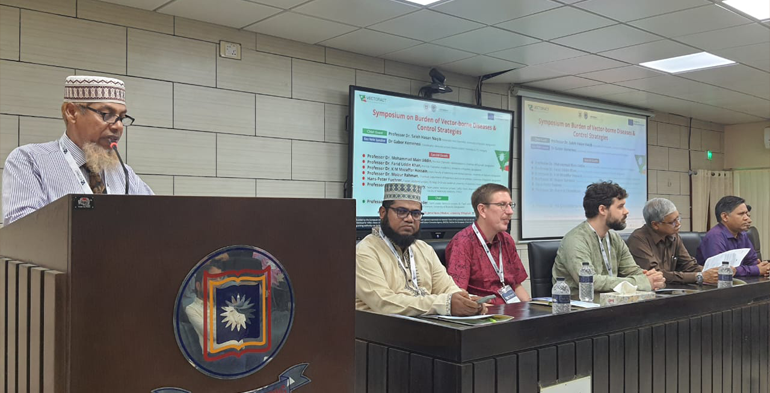
Agrilife24.com:A high-profile symposium titled “Burden of Vector-borne Diseases & Control Strategies” is set to take place on Sunday, August 7, 2025, from 9:30 AM to 1:00 PM at the Engineering Faculty Gallery (Ground Floor), University of Rajshahi (RU).
Organized by the VECTORACT-RU Research Team, this significant event was bring together researchers, academicians, public health experts, and international collaborators to address the growing challenges of vector-borne diseases in Bangladesh and beyond.
Agenda Highlights
The symposium was commence with a welcome and registration session at 9:00 AM, followed by self-introductions from participants and a formal welcome address by Prof. Dr. Md. Jalal Uddin Sarder, Team Lead of VECTORACT-RU and Founding Dean of the Faculty of Veterinary and Animal Sciences (FVAS), RU.
The Chief Guest, Prof. Dr. Saleh Hasan Naqib, Hon’ble Vice Chancellor of the University of Rajshahi, will offer his remarks before the technical sessions begin.
Special addresses will be delivered by:
• Prof. Dr. Mohammad Main Uddin, Pro-Vice Chancellor (Administration), RU Prof. Dr. Farid Uddin Khan, Pro-Vice Chancellor (Academic), RU
• Prof. Dr. K M Mozaffor Hossain, Dean, FVAS, RU
• Prof. Dr. Moizur Rahman, Chairman, Dept. of VAS, RU
Technical Session and Keynote
The keynote address will be presented by Dr. Gábor Kemenesi, VECTORACT Coordinator from Eötvös Loránd University (ELTE), Hungary, on “MOSQUITOES: History, Diseases and Current Challenges”.
Key technical presentations include:
• Overview of the VECTORACT Project by Dr. Abdulla Al Mamun Bhuyan (Project Manager, VECTORACT-RU)
• Control Strategies of Vector-Borne Diseases in Bangladesh and Limitations by Dr. Tilok Nath, Associate Professor, Sylhet Agricultural University
• Mosquito Control in the United States by Dr. Jony Albart Uelmen, University of Wisconsin, USA
• Status and Distribution of Vectors and Vector-Borne Diseases in Bangladesh by Dr. Mohammad Shafiul Alam, icddr,b, Dhaka
• Detection of RNA Editing Events in Plasmodium falciparum by Prof. Dr. Md. Thoufic Anam Azad, RU
A panel discussion led by Prof. Dr. Bidhan Chandra Das, former Vice Chancellor of North Bengal International University, and Prof. Dr. Mohammad Mahbubur Rahman of RU was offer critical insights into policy and research directions.
This symposium bridges local challenges with global expertise to combat diseases like dengue, malaria, and Zika that disproportionately affect Bangladesh. The VECTORACT Project is pivotal to advancing sustainable solutions." Dr. Israt Zerin Moni expertly guided the symposium as Master of Ceremonies. The event brought together the dedicated VECTORACT Project RU Team, including Dr. Md. Hemayatul Islam, alongside key international collaborators Dr. Kornelia Kurucz (ELTE, Hungary), Dr. Lindhorst Zoe (Vetmeduni Vienna, Austria), Dr. Shahi Barogh Bita, Dr. Zsofia Lanszki, and Dr. Abderrezag Samir. They joined over 70 distinguished attendees – researchers, public health officials, veterinary professionals, and policymakers – for this critical dialogue on vector-borne diseases.
Prof. Dr. Md. Jalal Uddin Sarder, Team Lead, VECTORACT Project; Founder Dean, Faculty of Veterinary & Animal Sciences (FVAS), RU.
"Collaboration is key in vector control. Insights from the US, Europe, and Bangladeshi field research will drive actionable strategies for our communities."
Dr. Abdulla Al Mamun Bhuyan, Project Manager, VECTORACT-RU.
Closing and Networking
The event was conclude with closing remarks by Dr. Nurul Islam, CVASU; Dr. Hans-Peter Fuehrer, Austria; Dr. Kornélia Kurucz, Hungary; Prof. Dr. Md. Jalal Uddin Sarder (Chairperson) RU team Vectoract project followed by a photo session, networking opportunities, and lunch.
This symposium is an important platform to strengthen national and international collaboration in vector-borne disease control and will support policy shaping and innovative research. The VECTORACT initiative, with support from global institutions, continues to foster cross-border knowledge exchange to tackle the burden of vector-borne diseases affecting public health in South Asia and beyond.
























